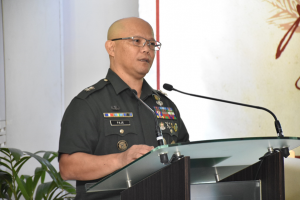
Major General Glen Paje, Deputy Chief of Staff for Civil Military Operations of the Armed Forces of the Philippines, cited significant factors that led to the liberation of Marawi against the Maute group during the five-month-long armed conflict in the city that led to the declaration of Martial Law in Mindanao.
Paje served as resource speaker during the Development Academy of the Philippines’ Kartilya Session entitled “Marawi Liberation” held last September 28 at the DAP Building in Pasig City.
Paje stressed that one of the factors that contributed to the positive outcome of the AFP’s operation in Marawi was the military’s ability to adapt to the dynamic environment. “We had to adapt to the large-scale and long-running management of internally displaced persons or evacuees,” said Paje as he noted that they also provided the evacuees adequate shelter, food, potable water, and other basic necessities, whose provision is actually not a traditional role of the military.
Information dominance
Paje emphasized that information dominance through media management and civil military operation efforts have helped the military to successfully counter the enemies’ propaganda by using media platforms as military authorities were able to effectively communicate their narrative to almost all of their target audiences.
“As we dominated the information environment, we translated our gains in the main battle area into strategic and moral victory by conveying the good deeds of our troops into the hearts and minds not only of the affected residents but also of the public,” the deputy chief of staff said as he claimed that the military clearly won the battle of perception.
He highlighted that the battle of Marawi was a battle of the entire Filipino people against the evils of terrorism since the government forces recognized that terrorism cannot be addressed by military solutions alone. Hence, the government forces harnessed a wide array of support from various sectors of Philippine society, which is commonly known to the military as the “whole-of-nation approach.”
Support from ordinary people
Paje also cited the support they have received from ordinary people, such as elementary and college students, teachers, professionals and those from the medical profession who sent simple letters that served as a very huge encouragement and morale booster to all the troops.
As this was going on, he also said that firm and decisive commandership was also manifested by military commanders at all levels of command. It provided a clear and steady source of motivation when the troops shared the risks at the frontlines. This act of courage, he said, kept the morale of the troops very high.
Paje further stressed that the commitment of the military to protect the people helped them to end the battle of Marawi with a resounding victory despite the very high probability of getting hurt or killed. “Our troops never hesitated to risk their lives in order to rescue the citizens who were trapped in the battle zone,” he said.
Martial Law
The implementation of Martial Law was also a significant factor for the success of the military’s campaign since it eliminated the enemy support system and restricted the movement of the renegade group’s sympathizers as well as the inflow of supplies to the terrorists.
Paje expressed elation as he related that the military were not accused of even a single violation of human rights throughout the implementation of Martial Law during the siege of Marawi, saying that the commendable attitude and discipline of the troops helped establish a reputation of dedicated, professional, self-sacrificing, and servant soldiers.
On the other hand, he explained that the battle took five months despite the military’s all-out offensive to vanquish the enemies because of certain considerations, among them the direct order of President Duterte to respect all religious structures within the city.
Defense strongholds
With over 35 mosques in the main conflict area being used by the enemies as their defense strongholds, ammunition storage, and command-in-control centers, this made the government troops carefully plan on how to draw them out from the protected buildings while trying to minimize structural damage.
The military official added that the enemies used human shields, which further limited the troops’ capability to move forward. Likewise, the enemies’ indiscriminate violation of the United Nations rule against laying improvised explosive devices and landmines also gave government troops difficulty since they had to meticulously clear the roads and buildings, a very tedious process in itself.
In closing, Paje emphasized that there is no room for divisiveness among the Filipino people in the serious matter of terrorism. “We should be united for this fight because while we won the fight in Marawi, there are still sleeper cells all over the country,” he declared. – Jeannalla Burns




